Daniel Ellsberg on the Importance of Julian Assange
The former military analyst shares his thoughts on the future of U.S. intelligence with Truthdig Editor in Chief Robert Scheer.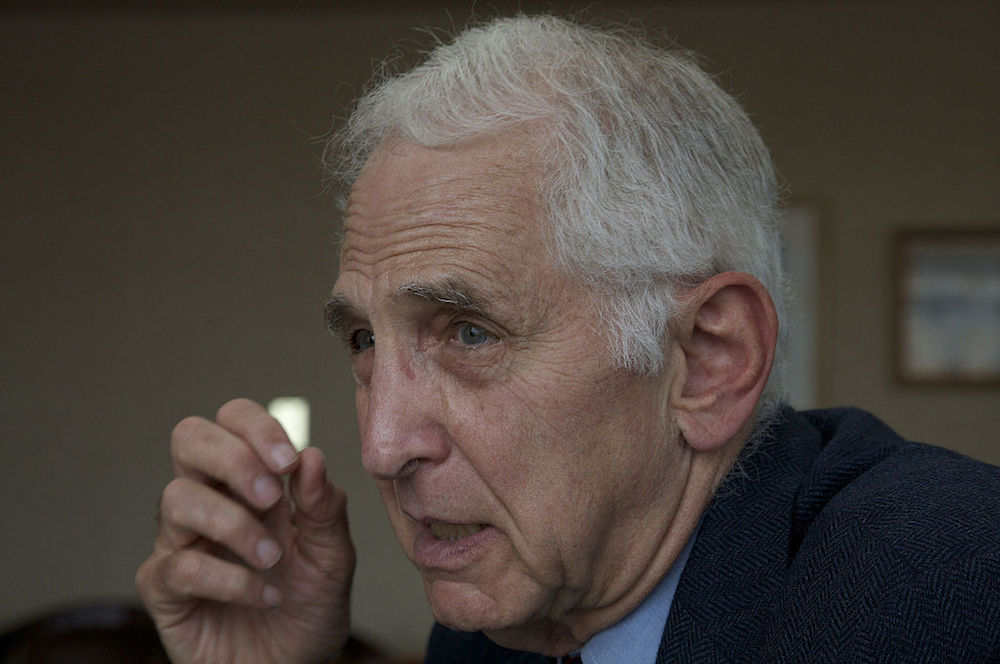 Daniel Ellsberg. (Christopher Michael / Wikimedia Commons)
Daniel Ellsberg. (Christopher Michael / Wikimedia Commons)
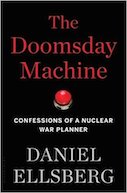
Purchase in the Truthdig Bazaar
Listen to the full conversation in the player above and read the full transcripts below, and find past episodes of “Scheer Intelligence” here.
Full transcript:
Robert Scheer: Hi, this is Robert Scheer with another edition of Scheer Intelligence, where the intelligence comes from my guests. In this case, Daniel Ellsberg. And I want to preface this by saying, I’m trying in this series of interviews to talk to people I call American originals. That somehow, out of the crazy-quilt of American culture, our diversity, our immigrant melting pot and what have you, we have produced a really amazing range of unique, interesting people. You could go back to Tom Paine, or all sorts of people come up through, you know, the Martin Luther Kings and the lesser-known people. Where do these people come from? They are, in my view, the saving grace of the American experiment; they keep us honest, they inform us. And Daniel Ellsberg is certainly very high up on that list. And one of the things about you, Dan–I’ve known you for a long time–is that you represent, I don’t know if David Halberstam meant the title of his book on Vietnam, The Best and the Brightest, ironically or what have you–
Daniel Ellsberg: Ironically, yes.
RS: Ah, but by some standard, they were the best and the brightest, and you fall into that category. Why don’t we just begin there? You were highly educated–just take us back to where this starts.
DE: Well, I can’t begin there with that title, but what he was referring to was that McNamara, who had been a professor at the Harvard Business School, he brought in people from elite, Ivy League schools who had done well academically, who were good at taking tests, and were reassuring to their superiors in various ways, and had every prospect of promotion and being good staffers. I came from the Harvard Society of Fellows, Harvard,; at Cambridge University, King’s College. I was, yes, highly educated; that didn’t prepare me for very wise judgment any more than it did the people I worked for.
RS: OK, but just to set the record, you did study at Harvard–
DE: I had a degree in economics from Harvard; I went to Cambridge University on a Woodrow Wilson fellowship. I was at the Harvard Society of Fellows after I’d come out of the Marine Corps. I spent three years in the Marine Corps during the Korean emergency, though I didn’t go to Korea. And then went to the RAND Corporation, which hired smart economists in the economics department.
RS: Under contract with the Air Force.
DE: They were, they did work for the Air Force. It was a nonprofit corporation, the original think thank, so-called, to do long-range research and development planning; the “R,” RAND, came from R&D, research and development.
RS: Yeah. Now you’re, of course, most famous for having gifted, I think, the American public through the New York Times and the Washington Post, the Pentagon Papers, which was an internal study that you worked on in the Pentagon about how the United States got into Vietnam and what the Vietnam War was all about, based on classified information, largely. But as I recall, at one point you believed in this war in Vietnam, right?
DE: Yes, I had become, in the late forties, a Cold Warrior, looking at the Berlin blockade and the takeover in Czechoslovakia, and then the Korean War, which I saw as aggression, and I was proud of the U.S. for rising to that challenge, it seemed to me after the Second World War, of opposing aggressors, as I saw it. I was even in the Marines when I extended my service there to go into the Mediterranean with my battalion. I was an operations officer, and I had been a company commander in that battalion, 3rd Battalion, 2nd Marines. And we expected a kind of war in, some sort of war in the Mediterranean at that time. Because Nasser, the dictator of Egypt, was expected to nationalize, or in fact during the summer did nationalize, the Suez Canal. And that expression of nationalism against the interests of the West, ah, evoked a British and French effort to overthrow Nasser, to regime change, essentially, by an invasion and by bombing. And I was proud of my president, though I hadn’t voted for him, President Eisenhower, the republican, who took on our closest allies, and pretty strongly intimated that he saw them as involved in aggression. And I was proud of a country that would oppose aggression even by its closest allies at that point, in 1956. We evacuated all the Americans from Alexandria on my ship when the harbor, Alexandria, was under air attack by the British and French. So I believed in the president, even when he was of a different party, even though he was a republican; I believed in what he was saying, but in particular I believed in a worldwide struggle against communist tyranny. And I was actually in domestic matters on the left side, definitely very much in favor of civil liberties, civil rights. I often thought that I would have been in the Freedom Riders had I not been working on this important anti-communist problem in Vietnam, which was quite diluted at that point. But I was working mainly on command and control of nuclear weapons at the RAND Corporation, and war planning, and that’s the subject of my forthcoming book in December, The Doomsday Machine: Confessions of a Nuclear War Planner. And there’s more confessions in that book than I envisioned when I started it; I thought of it as more of a rhetorical flourish, and then I realized that I had a good deal to confess during that period as to my involvement in nuclear war planning. But as a result of being in the Cuban Missile Crisis as a consultant in 1962, from the RAND Corporation, I did a study of nuclear crises and then–for the defense department and the state department–and then went into the defense department as a full-time employee, basically with the intent of seeing the government in crisis from the inside–my boss, former Harvard law professor, promised me. On the night of the Tonkin Gulf attacks, the alleged attacks on our destroyers, which historically here, you, Bob, were the one to show many years later that there had been no attack at all, to the commander, Commander Herrick, who always believed that there had been at least one torpedo. Well, the rest of us knew that there, were pretty sure there hadn’t been any torpedos, and that Herrick was wrong. But he, he believed that until, as I read in your work, by amazing investigative journalism you showed him that in fact there had been no torpedo, I remember the details of that, but we don’t need to go into those. But the point is that that very night, I was aware that the government was lying when they said that the evidence for an attack was unequivocal; in fact, it was extremely equivocal, and in fact misleading; there had been no attack at all. And that was pretty clear within a day or two, and yet the president lied to the Congress into what amounted to an undated declaration of war, as President Bush did many years later in terms of Iraq.
RS: Your role as a whistleblower, there’s two things that are interesting about it: how rare is the whistleblower; there must have been hundreds, if not thousands, of people who knew in real-time that that attack had not occurred. Certainly Lyndon Johnson and Secretary McNamara, Admiral Sharp who was head of the Pacific fleet, and many others. And we only learned about it, really, finally, we get the information two decades later. And meanwhile, a bloody war has been fought. And in the Ken Burns movie recently on PBS, that’s sort of looked over. You know, oh yeah, maybe there wasn’t an attack, or something. But it’s not–
DE: They don’t say?–I’ve forgotten, they don’t say absolutely there was no attack?
RS: Well, they do say–they say there was no, they say there was no evidence of the attack. But they don’t discuss when the administration learned this.
DE: Yeah. Right
RS: They don’t go into the deliberate lying to the American people. I know I’m putting a real fine point on it, but–
DE: It was the case that there was, of course, various kinds of eyewitness testimony of different kinds from radio operators, from sonar operators, from people supposedly seeing lights on the ship. Although, as the commander-in-chief Pacific later told me, Sharp, he said “You know, Marines on board ship at night can see just about anything,” as he put it to me. And the truth was that the preponderance of evidence was very clear day-by-day, within days of the attack. Now, the very night of the attack, it was very equivocal. But the preponderance suggested to most people that there had been an attack. I believe that there probably had been an attack, six to four, six to five or seven to five–now, that was wrong. Within a day or two, it came to be seven or eight to one, ten to one. But it wasn’t actually certain. And really, the last remaining piece of evidence, in a way, was Herrick’s, the commander of the Maddox, conviction. That the first sonar report of a torpedo had been correct. And literally, Bob, I’m talking to the person here–you’re the person who knocked down that last piece of evidence. And yet by that time, people were in no doubt that Herrick must have been wrong, as he was.
RS: OK. But to be fair to Herrick, the captain of that ship–and I did go interview him, and yes, we had a very good [Laughs] day-long exchange looking over the documents and everything else. In his report–and this is important. Because it really goes to the cynicism of people in power, their willingness to conceal the truth. Because in real time, before Lyndon Johnson ordered the attack on North Vietnam, in real time Herrick said: “I recommend that you hold off action because the facts are so uncertain.”
DE: Yes. No, he said recommend no action until daylight reconnaissance is possible, which was a few hours later, so that they could see if there were oil slicks or perhaps survivors in the wreck, because they thought they’d hit a couple of boats.
RS: Yeah. And there was no damage to the boat.
DE: Ah–no, that’s right. There was some evidence that there had been an attack, but it was very clearly contradicted by other evidence that indicated there was no attack. And what the American people were told, as a justification for actually carrying out acts of war against another country, 64 sorties bombing–the beginning of air attacks on the north. And there’d been nothing like that since the Korean War. The justification for that is not “we think there might have been an attack”; the justification was put as “there was unequivocal evidence of an unprovoked attack.” Just as we heard Secretary of Defense Rumsfeld later saying, you know, the evidence for WMD, for weapons of mass destruction in Iraq, is unequivocal, we not only know that they’re there, we know where they are. Well, we now know, first, that there were no WMDs at all; second, there was testimony to that effect, but it was–that there were–but it was very equivocal. It was by sources that the GErmans regarded as totally unreliable, for example. And other things. So what they presented, a very uncertain situation where the reality happened to be that in fact nothing had occurred of that sort.
RS: And it was fake news, which was reported faithfully by the American mass media, and not questioned in any way, in any serious way. And that brings me back to you role and the role of the whistleblower. Because you, as you said, had been hawkish; you had originally supported the war. And then you were working in the Pentagon. And I wanted to ask you about what turned you somewhat critical, and why you felt we should read the Pentagon Papers. And I know your, the person accused, your co-conspirator, Tony Russo, the late Tony Russo, who had worked in the RAND Corporation–he had a different vantage point on what was going on in Vietnam, because he was involved in reading the interrogation of Viet Cong prisoners. And I remember talking to him at the time, that he had very early come to recognize that we were party to torturing these prisoners. And he was offended by that, and I think it was one reason why he joined you in–
DE: Well, it’s the reason why he got fired from the RAND Corporation, which put him on the outside, and I think set him on a path that led him to say at one point, when I described the lying that had been going on, that I should put out the documents for that, which he didn’t have, actually. But he became quite radicalized, really, by reading these reports, because he began to identify with the earnestness, the patriotism, the courage and the responsibility of the Viet Cong prisoners and even defectors that he’d interviewed in–through an interpreter–in Vietnam. And he came to identify with them very much. Now, I never met such people. The people, the Vietnamese I met at great length were the ones fighting with us. Which is to say, fighting against the independence of their country from foreign control. He was fighting, he was talking to people who were fighting for the independence of their country.
RS: Basic to American foreign policy in this whole imperial march, including our treatment of Native Americans onward, has been a denial that other people have a claim on history. Basically a denial that they could possibly be motivated by sentiment and feelings that might be respected, certainly by them, maybe by others. And in the Ken Burns movie, that to my mind is its weakness; it is still America-centric. It’s our tragedy, it’s our war, it’s our sacrifice.
DE: Well, it also avoids a word that you just used, which was, I think, essential: you used the word “imperial.” And we are, I think, a covert empire in the sense where “covert” means an operation that is not merely secret, but it’s plausibly denial. It is denied that we are an empire. The means we use are secret and denied; “We don’t torture, we don’t assassinate”; actually, we do. But we not only do that secretly, but we deny that we do it. And you produce evidence. By the way, it gets into what we’ve been talking, in a way–you deliberately arrange for evidence that will support your denial, which is untrue. Cover identities, cover actions of various kinds, that seem to be suggesting that you were something other than what you are, like a spy. In particular, to protect the president from being recognized as the author of any of these criminal, murderous, and often hopeless actions to protect him from accountability. To imply that if it’s not American, it’s not even happening; but if it is happening, it’s not by us; if it’s by us, it’s not by the defense department, it’s some rogue element. And if you finally say, no, it was the defense department or the CIA–the president knew nothing about it, so don’t hold him accountable. I think the Burns-Novick movie never really comes entirely to grips with that. That what was motivating this other side was something we could recognize for ourselves, our own American revolution, a nationalistic independence, a desire not to be governed and rules and have your destinies determined by people thousands of miles away with a different–in our case it wasn’t even a different language, but it was in their case, different language, different culture, ethnicity and so forth. To free yourself of that is a very powerful motive, and one not to be destroyed, usually by bombing.
RS: Well, the main failing, I thought, in the Burns movie was at the very beginning when it is stated, “Our intentions were good.”
DE: Actually, the exact words were–it’s funny, they do always get quoted on intentions, actually. They didn’t use the word “intentions,” they say, “It was begun in good faith by decent men.” And I’ve asked myself, you know, first, who had–who could they identify as having good faith? Because supporting a French effort at reconquering an independent colony could hardly be a matter of good faith for America, which thinks of itself as anti-imperial, except for its own influence. And having been born in an anti-imperial revolution. And that’s why our imperialism has to be covert. Because it has to be denied, because it doesn’t go with our intentions. Well, that’s the opposite of good faith. You have to lie about what you’re doing and why you’re doing it. And what’s this, the decent men–I tried to think what they meant by that, given what we did, four times the tonnage of bombs on Indochina as of World War II entirely. I think decency has to be evaluated in that light, to some extent. All I can think of is, ordinary officials. They were not extraordinarily ignorant or ruthless; they were just ordinarily ignorant and ruthless.
RS: We assume the aura of innocence and decency as a matter of birthright. It goes to the whole mythology of the melting pot, which of course, we didn’t bring slaves over, we didn’t kill Native Americans, there was no conquest, there was no greed–
DE: Well, nobody says what you’re saying, you know. They just ignore it. Isn’t it a matter of ignoring it?
RS: No, it’s the leitmotif of the whole American story. That somehow this was a search for idealism, for inclusion, for individuality; this was the great march of manifest destiny. And we took the best from the rest of the tired, old world. And in fact, our founders were the people who wanted to resist that siren song, because they warned us about foreign entanglements; they warned us about how empire and republic are not compatible.
DE: Mm-hmm. Yeah. They were, however, slave owners.
RS: Yes, I’m not–
DE: And Indian killers.
RS: –I’m not challenging–
DE: And that wasn’t just a–we’re learning now, I think, how much we’ve denied to ourselves–
RS: I understand that, but any settler culture has the capacity to deny its brutality. It’s always done for its safety, it’s always done because it’s threatened. I understand that, but when I think back on this whole adventure, and what offended me about–can you give me the phrase again that–?
DE: Ah, it was done, “it was begun in good faith by decent men.”
RS: Yeah. Now, you and I know enough about this, and I think the Pentagon is quite clear about this, the Pentagon Papers report–it wasn’t done in good faith–
DE: No.
RS: –it was done in treachery. There was supposed to be an election in 1956.
DE: By the way, they–they attribute the lack of an election to Diem, President Diem, not to the Americans. Diem was supported by Eisenhower and kept in power because we knew he would resist an election, because we didn’t want an election; we preferred tyranny by Diem, or war, as concluded, to self-determination. To an election that would lead to a government that was independent of us.
RS: Well, Eisenhower in his book, in his memoir, Mandate for Change, said that Ho Chi Minh would have won the election with 80 percent of the vote.
DE: Yeah. They mention that, but they don’t mention that that’s why we put Diem in there. To keep, to prevent that election. They don’t show that as an American action.
RS: Diem was not just functioning in Vietnam, he was in a Catholic seminary in the United States, OK, in the northeast. That we brought him there–and then we end up presiding over his death, OK. Whether you call it an assassination or not, right–
DE: Yeah, I call it assassination.
RS: We were conscious–and this is in the Pentagon Papers–we were conscious that he was going to die.
DE: Yes.
RS: And that we had authorized it, or at least said we wanted that outcome, OK. So we killed the guy we called “the George Washington of Vietnam.”
DE: Yes. Yes, the day he was murdered was then celebrated by the government when I was working with it in the mid-sixties as national day, their national day was the day Diem was killed. When our puppet was killed was now their new national independence day.
RS: [omission] So this is a great opportunity for folks to understand, how does it work inside government. You were inside, and you were working on this study for the Pentagon about how this all happened. And there must have been a moment of revelation.
DE: The part that really changed my thinking very radically was reading the earliest part of the war–the earliest part of the study, I mean–which started in 1945. And by the way, it was internally, it was called “U.S. Decisionmaking in Vietnam, 1945 to ‘68.” Ended in ‘68, war had seven years to go, but people tended to think it was going to be over then–after ‘68 and after Johnson had bowed out of the election–wrongly. I went back, thinking the very, the very title was interesting there; it could have been classified, because most people would have said, what U.S. decisionmaking was there in ‘45 or ‘46 or ‘47? That was the French war. No, we were involved in aiding the French from the very beginning, bringing them back on transport planes and ships to reconquer their colony. And had supported it right from the beginning. When I’d read the earliest parts, which I left ‘til the end, ‘til 1969, I realized several things that I’d been totally misled on as an insider on a classified basis: one, what I just said; that there were two wars, a French war and then an American war–no, there was one 30-year war against the independence of Vietnam. In the first eight years, it was the U.S. and the French; and after that, it was the U.S. It was not that we were on the wrong side, as some people had come to feel when they looked at the relative merits of the Vietnamese fighting on one side or the other; we were the wrong side. To be fighting against independence was to be the wrong side. The other point was that we had never had good–well, not only good faith; we’d been lying all the time to our public, because the real motives could not have been sold very well, to fight against independence for this country in favor of the French or whoever, or ourselves. The cause I’ve described there, fighting what was from an American point of view not a noble cause, not a just cause, not a legal cause–it was aggression, it was wrongful cause, and unjust cause from the very beginning. And that meant to me, when I learned that in ‘69, late in the game now–I’d been, my first visit was ‘61, I went over, I started working on it full time in ‘64. For the first time, I realized that all the deaths in Vietnam–not just the civilians we were killing in great numbers, but the deaths of our troops, the deaths of Vietnamese altogether–were unjustified homicide. And that meant, to me, murder. And that that was something that had–I couldn’t cooperate with, and that I must somehow expose and resist, to the extent that I could. And the example of draft resisters who felt the same way, without having that specific information, but who understood intuitively and rightly by not believing their government–simply that–and looking at the facts freed of that delusion, they understood that it was worth their going to prison to warn their fellow countrymen that this was a wrongful war, that it was wrong to participate, and it must be resisted. Without the example of the draft resisters, no Pentagon Papers. For what that’s worth. Because it wouldn’t have occurred to me to do something that I was sure would send me to prison for the rest of my life. And even if there had been Pentagon Papers, it took a lot of other people acting unusually, like Alex Butterfield exposing the tapes, Judge Sirica pressing the Watergate burglars, McCord breaking under that, John Dean taking on the White House. To save his own skin, yes; but doing it by fighting the White House, calling them liars. Not a safe thing to do. Richardson, Elliot Richardson refusing to fire the special prosecutor, Cox. Ruckelshaus, doing the same, and so forth. Each of those people were essential in bringing about something that no one imagined as a possibility. And that was, bringing Richard Nixon, the president, to the point of resignation, facing impeachment.
RS: Why only you and maybe Tony Russo–well, not maybe, definitely Tony Russo–a few others in positions to know, and yet didn’t tell us?
DE: I waited almost 40 years for someone else to put a lot of information out, and that was Chelsea Manning, then Bradley Manning. And then three years later, Ed Snowden. Had there been a Chelsea Manning or Ed Snowden, both willing to risk their lives and certainly their freedom forever, in order to tell these truths about the war, which were–they were telling nothing that was unknown–what they were telling was known to hundreds to thousands of others, as you’ve said. That was also true of going into Iraq. Had they been at a high enough level to have that access–they didn’t have to be officials, they could be staff assistants, like myself, or researchers or whatever–or they could be officials who knew that we were being lied into a hopeless, desperate, aggressive war, as happened in 2002 to our attack on Iraq. Had they been at a high level and told us what was going on, I believe there would be no attack in Iraq, and the Middle East would look entirely different, and entirely less bad than it does now. But they don’t come very often. They do exist, and why not? People don’t ask themselves, what should I be doing about these lies that I know of? What should I be doing about this desperate–and they–should I be willing to risk my career?
RS: How dare we talk about “decent men” who knew it was based on a tissue of lies, that lots of people were getting killed including the almost 59,000 Americans, and that they had good intentions? Why didn’t they–
DE: Well, that’s absurd. Well, again, you can’t, good intentions–
RS: Why didn’t they tell the rest of us? Why didn’t they quit? Why didn’t they say my career has to move in another way? Why didn’t they–by the way, I happened to interview you at the time of your trial. And I remember, you were hoping McNamara would come out and say something in support of you.
DE: Yeah, I was, yeah.
RS: They didn’t. None of them did.
DE: It turns out to be, I–and I would guess not just Americans, but people, officials, people who identify with the government, who are privileged, who say “we” when they talk of the government. Something that’s even hard for me to get over 40 years later, it’s such an ingrained perquisite that you get, you know–what we do, and what we decide, and you’re talking about the executive branch of the president of the Oval Office. They’ll go along with anything to keep that, to keep from being fired.
RS: Anything.
DE: Anything, and I mean, nuclear war. And that’s everything.
RS: So they are the good Germans.
DE: Yes, we’re all good Germans, to a very good first approximation, and second approximation, and third approximation. That’s what “decent” means – decent Germans, decent Americans, ordinary people will–and I put it in terms of the government, but look at corporations. To keep their job, to keep their career, or just more generally to keep a privileged status, a membership. Like being white versus nonwhite, and to show, and to keep the sense that is superior. Or to be male versus womanly and unmanly. People will do, humans will do–almost all of them, not quite all–but almost all of them will do anything to avoid losing that membership and being ostracized.
RS: Let me end with a promo for your next book, which is coming out in December of ‘17. And in the beginning of the book, you describe that when you copied the Pentagon Papers, you were once asked, how many pages, and you didn’t give the pages. But the fact is, you copied other material that you had in your safe at the RAND Corporation, other classified material. And they concerned your work on nuclear weapons. And without, you know, people have got to read that book when it comes out, Doomsday. But just give us a prelude. What is–’cause you know, we went to sleep on the nuclear issue, we stopped thinking about it ‘til Korea came along, and now we think about it again. Can you give us the quick promo for this new work?
DE: One element in the book is that in 1969, Nixon was, like presidents before him, like the one he’d served, President Eisenhower when he was vice president, was threatening nuclear war to North Vietnam. That was a very big secret, which only a few people knew. And I knew only vaguely–Mort Halperin knew it in more precise, and he told me–very few people knew that. I think that would have been carried out, and we would have seen nuclear weapons used on humans for the first time since Nagasaki in November of 1969, actually. Which was when his ultimatum expired. Except for the fact that two million people on October 15th, did what was amounted to a general strike. They didn’t want to call it that, it sounded too radical, so they called it a moratorium, taking off from work, no business as usual. And from schools, and going into public squares, and rallies and everything, and asking for an end to the war. And when Nixon–they did not know that there was an impending nuclear strike that had been threatened, and which I believe would have been carried out. But when Nixon saw that many people in the streets, he knew: If I use nuclear weapons now, not just in threat but on people, the first time, we won’t see two million, we’ll see 20 million people or more in the streets. And the North Vietnamese will expect it, and they won’t give in, they will wait for that to have its effect. So he didn’t do it. And those people, without even knowing what they were doing, the effect they were having, almost virtually any of them–virtually any of them. And the next month, in November, were in fact prolonging the moratorium on the combat use of nuclear weapons by another 40 years and more. So, on the one hand it was unlikely that they would have that success, and they didn’t know they were even having it; but by resisting what they did see, which was a prolongation of the war that should not happen, they acted appropriately. Which is, they stopped business as usual. That could happen again. I think nothing less than that will protect us, actually, from war with North Korea, war perhaps in Syria or Ukraine. And war with Russia, which is a real possibility over Ukraine, should not be on the table. Because war with Russia is very different from war with Vietnam or Iraq or Iran. It means almost surely escalation to nuclear war, which leads–and this is another factor in my book–we now know leads to nuclear winter. The diminution of sunlight by the smoke from burning cities, which will kill harvests and starve nearly everyone on earth. So what the book shows is that our leaders, one of the things that they have needed to keep secret is that they have been consciously gambling with the possibility of ending most life on Earth all this time. And they should never have been doing that, and one instance of that was actually Vietnam. It also came up again three years later, in ‘72, when Nixon considered nuclear weapons and said to Henry Kissinger, No, I’d rather use the nuclear weapon, got that, Henry? You know, even Kissinger said, Oh–in ‘72–Oh, I think that would be just too much. He said, Too much? Does that bother you, Henry? I just want you to think big, for Christ’s sake! And that was the president of the United States. That was before the landslide election that brought him into reelection. That sentiment and that readiness did not keep him from being reelected. And that’s the danger, as we all know, we’re facing now with the current president.
RS: Well, that’s a chilling moment on which to end this interview with Daniel Ellsberg. [omission] Our producers are Joshua Scheer and Rebecca Mooney. Kat Yore and Mario Diaz provided the brilliant engineering work. And here at the Northgate Studio of the UC Berkeley journalism school, Chris O’Dea has been the engineer pulling this all together, and we want to thank him. Thanks for listening.
Your support matters…
Independent journalism is under threat and overshadowed by heavily funded mainstream media.
You can help level the playing field. Become a member.
Your tax-deductible contribution keeps us digging beneath the headlines to give you thought-provoking, investigative reporting and analysis that unearths what's really happening- without compromise.
Give today to support our courageous, independent journalists.
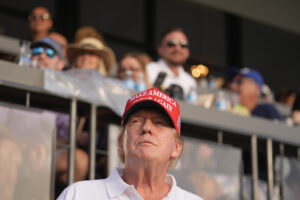
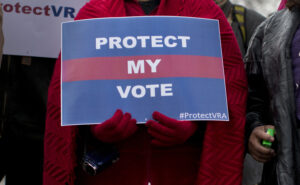

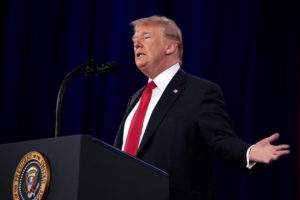

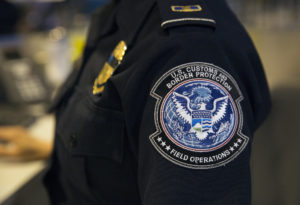
You need to be a supporter to comment.
There are currently no responses to this article.
Be the first to respond.